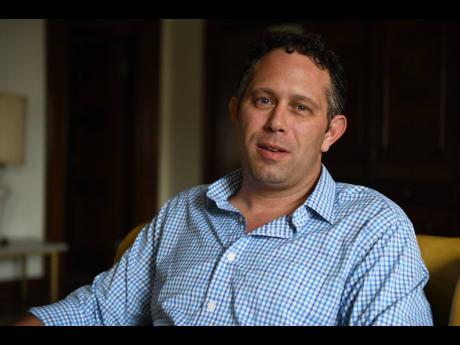BPO sector treads with cautious optimistism
Frustrated by the inability to provide guarantees to prospective clients due to the continuous rollover of short-term extensions for the temporary work-from-home arrangement for employees in the business process outsourcing (BPO) industry since July 1 last year, operators in the sector are calling for decisive action from the government or face a possible exodus of outsourcing operations to more business-friendly, near-shore destinations.
However, Senator Aubyn Hill, minister without portfolio in the Ministry of Economic Growth and Job Creation (MEGJC) who has oversight responsibility for the sector, is confident that a permanent fix is imminent. “I come to this position with my own excitement, I have no doubt that having lived in India for a long time, and having gone to the Philippines to see their operations, that we are very well positioned to compete.”
“More importantly, BPO operators are experiencing 12-15 per cent increase in productivity from the work-at-home regime, and what that does is give our foreign investors room to expand and that is what we are seeing now.” continued Hill, who also has responsibility for water, land, and the Special Economic Zone Authority of Jamaica (SEZAJ).
Yoni Epstein, founding president of the rebranded Global Services Association of Jamaica (GSAJ), said Hill is ideally placed to make a difference.
“It is good to hear his support and understanding of the sector,” said Epstein, who is chairman and CEO of top regional outsourcing outfit itelBPO Smart Solution. “I welcome it because we have never had a minister that comes into this role that truly understands the industry, but with his time in India he would have grasped the fundamentals.”
POLICY IN LINE WITH DIRECTION
“However, we have had ministers of government in the past who wanted to support the industry by getting things sorted but did not quite see it become a reality. So my only hope is that Minister Hill is not only going to just use his industry knowledge to say he will get it right, but that he will actually get it right, because the opportunity is tremendous for both the operators and the country,” Epstein added. “… but we must ensure that the policy is in line with the vision and direction of the sector.”
“The outsourcing sector is the only industry that has remained strong and has grown amidst what is going on globally and if I was a betting man I would place my bet on a government supporting that industry,” Epstein argues. “We have had many discussions and Minister Hill in his capacity has the authority to make the necessary changes so that policy drives the vision of the industry and the people that are driving the policy are in the position.”
“If those two don’t coincide, changes need to be made for that to happen or we are going to continue to be in the same position,” he added. “We are in a commoditised world, and if we don’t have the policies to remain competitive in Jamaica, people are going to go where they can be competitive.”
The SEZ Act, which was passed in January 2016, repeals the Jamaica Export Free Zone Act, but has been a vexed issue for the outsourcing sector in particular, which says the changes were having a negative impact on growth and only quieted after the intervention of Prime Minister Andrew Holness, who demanded that a compromise be found between both parties.
The industry came under increased scrutiny after the Portmore office of outsourcing firm Alorica became the epicentre of a surge in COVID-19 cases in April, triggering a temporary, massive scaling down of BPO firms across the island and the implementation of a work-from-home order as the Government moved to prevent a nationwide outbreak. Alorica has since closed its Portmore operation, but has reopened its Kingston site and is now a registered member of the GSAJ.
The GSAJ then recommended an amendment in the Special Economic Zone Act to allow some 25 per cent of employees to permanently work from home, after workers’ productivity jumped to double-digit figures and operational costs plummeted dramatically, but the group was only gifted another suspension of tariffs by the Ministry of Finance, effective January 1.
But Hill is certain that the Government will fix the issue.
“As the minister in charge of the Special Economic Zone Authority, I am going to ensure that the issues are addressed, and addressed in a timely fashion,” Hill said. “We will be more decisive … we are going to meet and discuss the issues and make the necessary decisions, because we know what has happened to other sectors in the economy.”
FOLLOW THE RULES
“We need to let them grow ,but they must follow the rules; but we also must let them understand the rules to follow to get it done.
“So we are looking to make work from home a permanent arrangement. It is the way of the world going forward, so work from home is here to stay,” Hill said. “The most of what they do is on a computer, and the Government now has to look at ways to make that a reality.”
The local BPO sector has grown from just over 12,000 employees to an estimated 39,000 in the last eight years and is currently valued at US$780 million. Approximately 110 players are operating in the sector, including the call centre operations and players in the financial and hospitality sector, as well , but some are yet to join the GSAJ.,” Hill said. He added that the Alorica experience will show the need for the stakeholders to have the support of the GSAJ.
“The GSAJ is doing a wonderful job, and we believe making it mandatory for BPO operators to join is the move to make at this time,” Hill said. “We want to see this happening because there are other sectors that have really been affected by COVID-19, and as the global supply chain becomes shorter, Jamaica will be the answer to our US clients, so It is important that people working in the BPO space seek to be a part of the GSAJ.
“Alorica are now members and this must be a part of the new norm, because as we introduce regulations to assist in the growth of the sector, operators must be a part of the association to benefit. But several players are of the view that GSAJ membership can be encouraged, but cannot be forced.”
An industry player, who did not wish to be named, said there should be clarity and dialogue with BPO companies on joining the GSAJ.
“It must be the task of JAMPRO, the SEZ and the GSAJ to ensure the new entrants understand the importance of joining the association, because the minister could do more harm than good trying to force this choice on someone,” said a player, who asked not to be named.
When pressed for his thoughts on the call for outsourcing firms to facilitate union representation for their workers, Minister Hill said, “I work in the Ministry of Economic Growth and Job Creation, I go after creating jobs, I go after making opportunities for investors, and there is a fine Ministry of Labour and Social Security.
“If near shore is working for us and investors are yearning to come here, then we must have the workforce that they need, and that is what I am focused on,” Hill said. “The Government is working in partnership with a number of entities and GSAJ, and we intend to get things done.”


